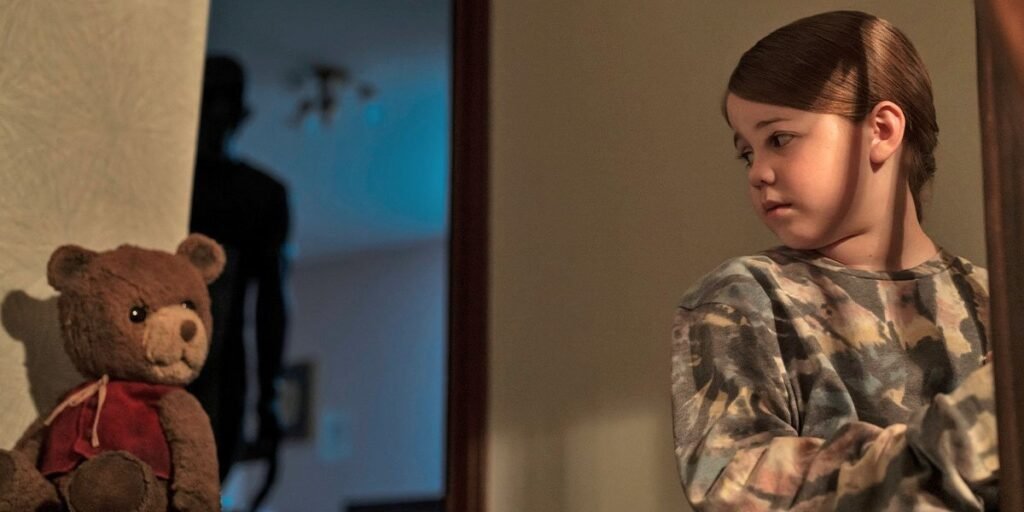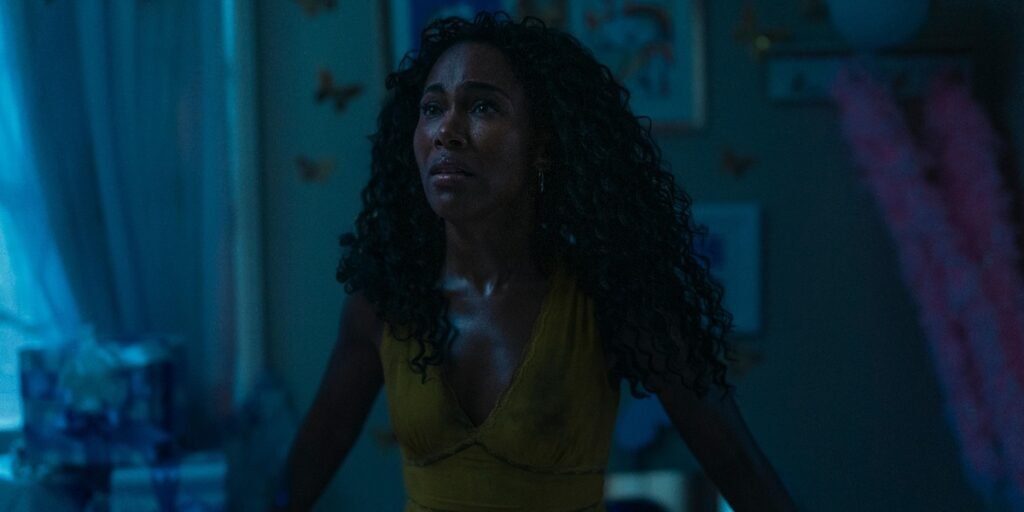In the newest addition to the Blumhouse lineup, director Jeff Wadlow unveils his horror creation, Imaginary. The film navigates the blurred lines between the tangible and the unseen realm, where shadows of the past and present intertwine. It explores the eerie recesses of childhood memories, specifically haunting specters of imaginary friends.
Preying on our nostalgic vulnerabilities, Imaginary leads one to anticipate a haunted ride. However, Wadlow’s horror flick cruelly falls short of these expectations, as it notably lacks the sinister touch of creativity and, ironically, imagination.
What Is ‘Imaginary’ About?
The story unfolds with Jessica (DeWanda Wise), a writer and illustrator of children’s books, whose creative mind is overshadowed by relentless nightmares. Needing to break free from these haunting visions, Jessica decides that a change in surroundings may offer her some rest. Accompanied by her husband and his two children, they move into the familiar walls of Jessica’s childhood home.
Almost immediately, young Alice (Pyper Braun) forms a bond with Chauncey, her imaginary teddy bear. Initially innocent, Chauncey’s facade begins to unmask as the movie plays out. We soon discover that this seemingly benign stuffed companion is, in fact, a malevolent entity from Jessica’s childhood past.
Blumhouse’s ‘Imaginary’ Relies on Too Many Horror Tropes

While the film’s initial storyline holds promise, the narrative slowly unwinds, ultimately failing to reach its full potential. The plot feels underdeveloped, depriving it of the essential tension needed for a true horror experience. Characters, such as the mentally unstable parents, seem to be inserted for shock value or to evoke sympathy, yet their significance feels wasted. What could have been a meaningful exploration of character depth is squandered, leaving the story lacking in any substance.
Unfortunately, Imaginary treads common ground in the horror genre with clichéd elements that have become all too familiar. Despite the potential in these established foundations, like the foreboding basement, a sinister dimension, an elderly character with ancient knowledge, and kids talking with demons, Imaginary misses the mark by failing to ingeniously leverage these tropes.
Adding to the disappointment, the script condescends to the audience by overexplaining every plot detail, treating viewers as if they were clueless. Gloria, played by Betty Buckley, is there to move the story along, making sure the audience is on the same page. Unfortunately, her explanations tend to veer into redundancy, making the experience feel occasionally insulting.
DeWanda Wise’s Performance Helps To Redeem the Film

A redeeming quality of this film lies in the exceptional performances of the actors. Despite the limitations of the material, the cast delivers outstanding performances, with DeWanda Wise in particular carrying the weight of the entire film on her shoulders. Her portrayal elevates the viewing experience, making the film more bearable to watch.
Another noteworthy component to highlight is “The Chauncey Song,” crafted by the talented composer Bear McCreary. The haunting melody hints at any unsettling events that may be coming, and as it weaves its eerie tapestry, a sense of foreboding washes over. Its ghostly notes are reminiscent of a long-forgotten playground overrun by ghosts and will leave a mark that will haunt your thoughts for days.
In the end, Imaginary stumbles in the deliverance of thrills and jump scares that Blumhouse is known for. In a genre that thrives on the unexpected and the artful manipulation of traditional elements, Imaginary disappoints with its lackluster execution.
Rather than breathing new life into these established conventions, the film falls short, wasting the opportunity to infuse creativity into a narrative that could have transcended the limits of familiarity. While the actors’ commendable efforts offer a glimmer of hope, the film, unfortunately, falters consistently, marking it a substantial misstep within the horror genre.
Agents of Fandom socials for all the latest entertainment news and reviews.
'Imaginary' Review
'Imaginary' ReviewThe Good
- The actors poured their hearts into the performances.
- "The Chauncey Song" is hauntingly catchy.
The Bad
- There wasn't enough creative spin to sell the overused horror tropes.
- The underdeveloped story is sorely obvious.
- A complete lack of scary moments doesn't bode well for a horror movie.











